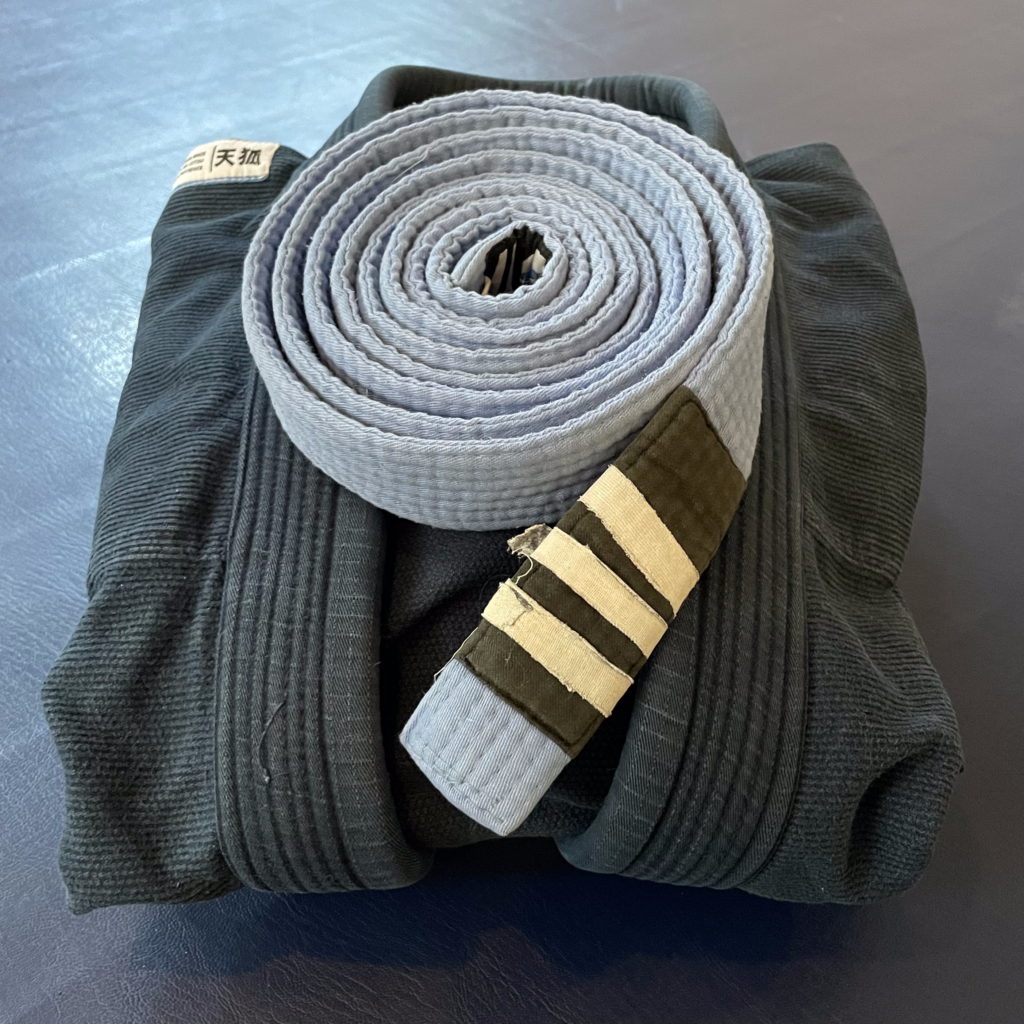
This weekend marked four years since I formally started my Brazilian jiu-jitsu journey with Precision Jiu-Jitsu, after getting a jump start from Antifragile Training and Armed Dynamics. I’ve talked before about how BJJ can be an effective route to learning how to be comfortable with being uncomfortable, and to learning resilience and grit through physical experience. Today, I’m thinking about one of the other lessons: the power of consistently showing up.
BJJ is a pursuit where you will regularly see people training four to six times a week, or even more. When you’re just diving in, it can be intimidating to think that you need to keep up with that kind of intensity. Trying can be physically punishing, especially if you didn’t come in already very fit and able to manage your work effort to allow for little recovery time. It’s no mystery why some who jump in to a full schedule get injured or burn out quickly, even if they make large gains in those early months. Instead, some beginners decide to go whenever they are able, which is every day some weeks and none others. That approach has the advantage of being flexible around the rest of your life, but before you become dedicated to the sport, there is often temptation to skip a class for convenience or comfort more than true schedule conflicts. A one-week break turns into two or three and before you know it, you’re canceling your membership because you’re not using it anyway.
What worked better for me was listening to the advice I got early on from Immediate Action Combatives. Cecil advised me to pick some specific classes or number of classes that I could commit to every week, to do whatever I could to make it to them, even if it was only one or two a week. To him, it was more important to show up on a regular basis and remove excuses for skipping out here and there, than to pursue high volume training. The learning and improvement might come a little more slowly than going the full immersion route, but it would be more sustainable for a long-term activity, both mentally and physically. I started at just twice a week, but I made it to the gym twice every week unless I was sick. If I was hurt, I sat out parts of class or went as light as possible. There were some rough weeks where I wasn’t home hardly at all and slogging off to class when I was. Since then, every time I’ve adjusted my commitment, I’ve been clear to myself exactly what it meant and the specific excuses that I would accept within myself to not go. Right now, that means three classes every week unless I’m sick or on the road.
Improvement in most things is incremental and non-linear. The nature of a combat sport is that learning a move does not guarantee mastery or success every time you attempt it against another thinking, moving person. Revisiting a technique may mean finding a half-dozen new details that may or may not have been mentioned the first time around and you certainly wouldn’t have remembered anyway because you were too busy trying to absorb some other part. Occasionally, seeing a fundamental move again in a lesson only convinces you that you stupidly didn’t manage to understand it at all even though you’ve been training for years. Short breaks can result in what feels like disproportionate loss of memory and agility, not to mention conditioning. It’s even harder because your peers are likewise on their own journeys, and you can’t measure yourself against them. They may be larger or longer or stronger, or have more time to train, or show more talent at moving their bodies, or need less effort to remember a way of moving. It takes a long-term view to see progress, comparing yourself to the you of a few months or even a year ago might not be enough to see how far you’ve come. For me, it’s taken almost this long to realize that lessons now are more reviews and refinements or variations on and extensions from something I’m familiar with, than entirely new material, . At least for right now; that could change next week.
Fortunately, it turns out that simply showing up and participating regularly can teach you a lot. Taking notes or keeping a journal, and being disciplined about drilling and practicing new skills over and over again help, of course, but you can also just keep your personal training commitment. Not every class will be a leap forward, and you will forget things in between. But you’ll start remembering things too, from hearing them over and over again. It turns out that there is value in repetition and in going through the motions, and doing the work consistently. Part of learning a new vocabulary, whether it be verbal, visual, or physical, is exposure. Hearing and seeing and doing over and over again will make the “words” stick eventually. At first, repeating them will feel like an awkward parroting, but the lingo will become more natural all by itself. Much like the lexicon of a new job or community can seem strange at first, being around it is usually enough to make it a natural part of your daily chatter even without studying, tests, and other classical ways of driving improvement.
At four years in, I’m just getting started. Most of what I know is how much I don’t know, certainly not well enough to perform on demand, against a difficult opponent. I also know, though, that there has been progress because every Wednesday, Thursday, and Saturday (for now), I’m at the gym. The more I’m there, on the schedule I can stick with, the more I seem to find familiar and can improve upon. If I go and think I’ve forgotten everything, I have a future opportunity to remember it again the next time I’m in. Oh, and the rank stripes and belts? Turns out they don’t matter nearly as they seem they might. All that matters is this class and the next one. Success and advancement are in disciplining your mind and body so that you can continue to show up and polish yourself just a little bit more every day.





